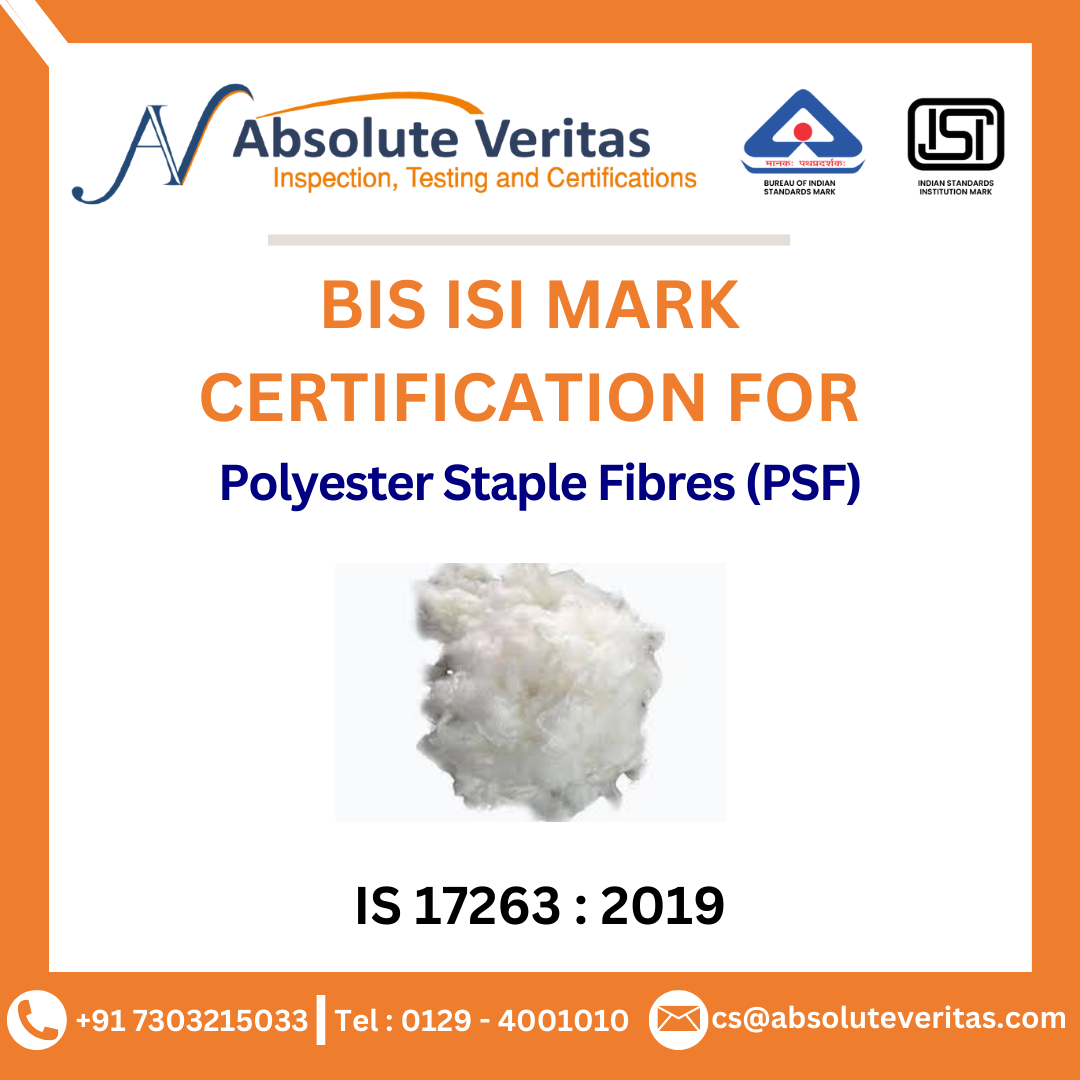Tel: 0129-4001010 Phone: +91 730 321 5033
Email: cs@absoluteveritas.com
BIS Certification For POLYESTER STAPLE FIBRES IS 17263: 2019
In today's competitive landscape, maintaining market presence without a certified, high-quality product can be challenging. Obtaining a BIS license may also be essential for selling products in the Indian market. To achieve BIS certification and ensure product quality, manufacturers must adhere to the specified Indian standards.
Let's delve deeper into at IS 17263: 2019 For POLYESTER STAPLE FIBRES
IS 17263: 2019 outlines the specifications for Polyester Staple Fibres (PSF), a type of polyester fibre produced from poly terephthalic acid (PTA) and monoethylene glycol (MEG) or from recycled PET bottle flakes. This standard, adopted by the Bureau of Indian Standards after approval by the Textile Division Council, covers all forms of PSF, including virgin fibres, dope-dyed fibres, cationic dyeable fibres, and various specialty fibres like spun lace, antimicrobial, nonwoven, flame retardant, siliconized, and microfibres.
However, it excludes fibres intended for use in cement matrices for construction purposes. The standard defines strict criteria for the physical and chemical properties of PSF, and fibres must pass confirmatory and microscopic tests as per IS 667. Virgin PSF must have zero isophthalic acid content when tested using Annex C of IS 16481. Additionally, the fibres must be free from major defects and comply with environmental standards. All tests must be conducted in a properly equipped laboratory according to the prescribed methods.
Tests
Required Tests for Polyester Staple Fibres
-
Test for Shrinkage of single polyester staple fibre
-
Test for crimp characteristics of PSF and fibre fill/nonwoven fibres.
-
Test for measurement of percent silicone on fibre
-
Moisture content test
-
Phosphorus content test
-
Antimony content in polyester
-
The hollowness of hollow fibre
-
Sinking time for spunlace fibre
-
Colour strength of the dope dyed product
-
Titanium dioxide in polymer
Here are the key benefits of getting ISI Mark certification:
-
Government Quality Assurance: The ISI mark indicates that a product meets the quality standards established by the government, ensuring compliance and reliability.
-
Mandatory Compliance: It is mandatory for POLYESTER STAPLE FIBRES to obtain the ISI Mark. Non-compliance can result in penalties, including material seizure and substantial fines.
-
Enhanced Market Competitiveness: Achieving certification significantly enhances your product's chances of success in the competitive market.
-
Consumer Trust: Consumers are more likely to purchase ISI-certified products, as they guarantee safety and quality. This certification helps build trust and confidence among buyers.
-
Market Benchmarking: Partnering with a respected brand allows you to elevate industry standards and establish a benchmark for your product's market value.
PROCESS FOR BIS ISI MARK CERTIFICATION

BIS CERTIFICATION PROCESS
Acquiring a BIS license requires a comprehensive review of manufacturing infrastructure, quality control abilities, testing resources, and production procedures. This thorough assessment guarantees that products not only adhere to regulations but also prioritize consumer safety and reliability.
NOTE:
For comprehensive guidance on the BIS ISI Certification process, please explore:
WHY USE ABSOLUTE VERITAS?
Absolute Veritas is a prominent organisation from the private sector of India primarily dealing with the Inspection, Testing, Audits, Certification of products& consulting services to various industries in India and worldwide, ensuring compliance with regulatory standards and industry requirements. Offering a comprehensive range of services including product certification, testing, training, auditing, and compliance services, Absolute Veritas helps manufacturers and importers achieve higher production efficiency and quality standards.
Absolute Veritas (AV) will handle end to end pre-registration request, sample preparation, documentation, testing and application process for ISI Mark Certification
For any questions regarding the most recent update on ISI Mark registration licenses, please reach out to us via email at cs@absoluteveritas.com








 ❮
❮
